President Tadić addresses UN SC on Kosovo
Monday, 21.04.2008.
23:00

President Tadic addresses UN SC on Kosovo "I would like to express major concern over the situation that has presented itself following the illegal proclamation of the independence of Kosovo and Metohija, the southern Serbian province that has been under UN administration ever since June 1999. Serbia has pointed on a number of occasions to the dangerous consequences of this illegitimate act which the provisional institutions of self-governance in Kosovo performed on February 17 this year. Not only is the sovereignty and territorial integrity of Serbia, a member of the UN, threatened by this unlawful act, but the illegal act of Kosovo Albanians has also led to an aggravation of security in Kosovo and raised a number of issues in other regions of the world as well. 'The state of Serbia is concerned over the fact that there has been no reaction of the United Nations, of UNMIK, on the occasion of the proclamation of the unilateral independence of the province of Kosovo and Metohija. Belgrade demanded that the UN representatives in Kosovo annulled that illegal act, but instead of that, we saw that the report by the UN secretary general only mentioned the unilateral proclamation of independence and confirmed the new reality on the terrain. It is completely unacceptable that the report does not specify the demands of Serbia or the country's arguments that the new reality is the result of the violation of Resolution 1244. 'Furthermore, according to the report, preparations are being made, with the approval of UNMIK representatives, for the implementation of the Martti Ahtisaari plan and supervised independence, although this plan was never discussed or adopted in the UN Security Council. 'Serbia demands a continuation of UNMIK's mandate in keeping with Resolution 11244, and we find as completely unacceptable any appreciation of the circumstances that have presented themselves following the unilateral proclamation of independence. Security Council Resolution 1244, according to Chapter VII of the United Nations Charter, obliges all member countries to respect the sovereignty and territorial integrity of the Republic of Serbia. The act of 35 countries that have backed the so-called independence of Kosovo, is in contradiction with the position of the UN Security Council and it has significantly weakened the credibility of the world organization. With this act, efforts are being made to give legitimacy to an illegitimate division of internationally recognized sovereign countries. Serbia warns of the fact that in case that a compromise solution is not found, the Kosovo case will become a dangerous precedent and that such a situation might open a Pandora's box with unforeseeable consequences for similar cases in many other parts of the world. This is why I once again call on the countries that have recognized Kosovo's independence to re-examine their decision and to take personal responsibility for the unimaginable consequences of such a precedent. I call on the countries that have not done that, to persist on observing the principles of international law. I expect help from all of you, so that, through new solutions, we could defend the law which all of us have to observe and help that the decisions of the UN Security Council regain the importance they deserve. ''I view as particularly dangerous the pressure certain countries are making on our neighbors to recognize Kosovo independence and I have to warn that this could lead to a destabilization of the region and jeopardize regional cooperation. 'As a president of Serbia, I claim that my country shall never recognize Kosovo's independence. This is why it is necessary to seek a new, stable solution, which would improve the extremely bad situation that was caused by the unilateral decision of the temporary Kosovo institutions. Serbia continues to be convinced that only with a continuation of negotiations can we reach a mutually acceptable and sustainable solution that will bring lasting peace to all the people in the Balkans. The UN Security Council is the only institution that can reach a legally valid decision. On March 17, 2004 a pogrom of Serbs took place in Kosovo and Metohija, about which I spoke at this very place on several occasions. On this very same day in 2008, violence broke out in the northern part of Kosovska Mitrovica. To our knowledge, international forces used extensive force against Kosovo Serbs who are in a very difficult situation that has been caused by the unilateral proclamation of Kosovo independence. In those clashes, several people were injured, and, unfortunately, one Ukrainian policeman got killed. The investigation that is under way will do its part of the job, but my appeal to international representatives is more than clear - that all restrain from force and violence, and that in the period to come, only trough dialogue and agreement we seek solutions to all risky and sensitive situations that might present themselves. I want to emphasize that Serbia is a peace-loving country committed to the preservation of its own sovereignty and territorial integrity, and that it has every reason to be worried about the fate of the Serb and other non-Albanian communities in Kosovo and Metohija. In the new situation, when illegally and contrary to Resolution 1244, temporary Kosovo institutions are being transformed into illegal state institutions, and when the EULEX Mission is taking over the jurisdictions from UNMIK without a corresponding decision of the Security Council, the Serbs in Kosovo feel very unsafe. The Serbs in Kosovo, whether they live to the north of River Ibar, or in the enclaves south of that river, have no trust in the Pristina bodies of authority. Kosovo Serbs are not ready to cooperate with the EULEX Mission as long as it does not obtain an explicit mandate of the UN Security Council. I remind you that the Serbs in the enclaves still live in very difficult conditions, that their freedom of movement is limited and that they spend their days in an atmosphere of constant pressure and threatening. I would like, at this point, to draw your attention to yet another negative consequence of the illegally proclaimed independence of Kosovo, to the impossibility to supply the health centers and hospitals throughout Kosovo and Metohija with medicine and medical equipment. So far, we have succeeded in resolving this situation ad hoc, with the great help of the World Health Organization. I express gratitude to the World Health Organization, but I point out the need for an urgent and lasting solution to this issue, since, I am certain, no one wants a humanitarian disaster that might come as a result of the chronic lack of medicine in the hospitals in which Serbs, Albanians and all other inhabitants of the southern Serbian province are being treated. These are just some of the problems that have affected the lives of Serbs after February 17, 2008, which is difficult as it is. Ever since the arrival of the United Nations in Kosovo in 1999, hundreds of thousands of Serbs have been expelled from their homes. Dozens of thousands of Serb houses have been burnt to the ground. Thousands of Serbs have been killed or have gone missing and are regarded as dead, and more than 150 Serbian Orthodox Churches and monasteries have been leveled. Since the arrival of UNMIK on June 10, 1999, there has been a total of 7,000 attacks on Serbs, 4,600 of which have been committed by fire arms. The Serbs in the province were exposed to the violence of Kosovo Albanian extremists, most of whom have not been punished for their crimes. This is why I hold that the acquittal of former KLA (Kosovo Liberation Army ) leader Hasim Taci is unjust and that the public in Serbia has every right to be embittered over such a verdict. ''Former ICTY chief prosecutor Carla del Ponte spoke on several occasions about the threatening and the murder of the witnesses in the Haradinaj case, and I expect from The Hague Tribunal to file an appeal against the unjust decision by the International War Crimes Tribunal. Ramush Haradinaj will not return to Kosovo as an ordinary citizen, but rather as one which has the intention of taking part in the province's political life and creating the reality our fellow-men there. This disputable verdict coincides with the testimony of former ICTY chief prosecutor Carla del Ponte, who in her book speaks about the trade of the organs taken out from the bodies of kidnapped Serbs. This is still another case which The Hague Tribunal should shed light on. Haradinaj is suspected with serious crimes against Serbs, the Roma and Albanians, and the court has to ascertain the whole truth and punish the perpetrators in accordance with the law, primarily because of the innocent victims. I hold that all criminals, regardless of their nationality, should face The Hague Tribunal, and that this is the only way in which justice can be satisfied and that once an for all, a stop be put on the painful issues of war crimes that were committed on the territory of the former Yugoslavia. The International War Crimes Tribunal was founded by the United Nations, and the Republic of Serbia, as a full-fledged member of the UN, is fully and clearly committed to the realization of a full cooperation with the Tribunal. Therefore, I would like to repeat once again that Serbia is doing all that is in its power so that this cooperation be successfully brought to an end. UN SC Resolution 1244 has to be fully observed. Only in this way can a further deterioration of the situation on the terrain be prevented. The clearly defined mandate which the Security Council gave to UNMIK is not to be undermined, and we strongly insist that the jurisdictions of UNMIK be not transferred onto any other body. Therefore, the basic position of the Republic of Serbia is that EULEX is operating beyond the frame envisaged by Resolution 1244 and that their activities are in contradiction with the principles of the UN Charter and the Helsinki Final Act. Let me be clear: the issue here is not whether or not the EU is welcome in our southern province. However, for any such engagement, a clear legal mandate has to be provided for, and this mandate can only be obtained by a decision of the Security Council. The Republic of Serbia is ready to take a constructive part in seeking solutions to such a complex issue. No one has the right to obstruct Serbia in its legitimate and peaceful defense of the country's integrity, or to jeopardize the realization of our other legitimate goal - membership in the European Union. I am fully convinced that these two goals are linked, and that without joining the world, Serbia will not be able to defend the country's integrity, and that without defending its integrity, it will not be possible to ensure European integration. We will, therefore, be ready to sign the Stabilization and Association Agreement with the European Union as soon as it is offered to us, and thus achieve the soonest possible status of an official candidate for membership. In spite of our present difficulties, I want to reiterate this principled stand, which most of my fellow-citizens share with me. Serbia has been on the road of European integration ever since 2000, and along with the fact that it will bring unequivocal economic benefit to all the people in Serbia, the signing of the Stabilization and Association Agreement will also enable a continuation of the legitimate fight for the preservation of the integrity and sovereignty of our country, since the Agreement envisages an indisputable respect of UN Security Council Resolution 1244. Serbia's most important internal political goals are the preservation of territorial wholeness and the country's integration into the EU. These two aims can be achieved only if realized at the same time. Article 135 of the Agreement specifies that Kosovo is under temporary UN administration, on the basis of Resolution 1244, as well as the signing of the Agreement does not prejudge the future status of our province. By repeating once again that Serbia views Kosovo as its inseparable part, I want to inform you that parliamentary and local elections will beheld in Serbia on May 11, which are of crucial importance for the consolidation of democracy in Serbia and its integration into the EU. It is of particular importance that on that day local elections be also held in Kosovo and Metohija. We hold that it is important that everywhere in Kosovo, where the inhabitants recognize the Republic of Serbia as their own state, the citizens elect their municipal, as well as parliamentary representatives in a democratic manner. The Republic of Serbia is willing to be a constructive partner in the achievement of peace and reconciliation in the region. We are committed to an open dialogue and negotiations, which will be held in good faith with everyone. We also continue to be committed to the principles of international law. Serbia wants all the problems to be resolved in a peaceful manner. We want to deal with issues that are of vital importance for the people that are most threatened in the province. In the end, please let me point out Serbia's principled, deeply- rooted position that regional peace and security are the issues that are of greatest importance for all the countries in the region and that lasting peace and stability can be achieved not by imposing solutions and use of force, but rather by dialogue, agreement and the respect of laws." The full text of President Boris Tadic's address at the United Nations Security Council session dedicated to Kosovo, on April 21, in New York. The full text of President Boris Tadic's address at the United Nations Security Council session dedicated to Kosovo, on April 21, in New York.
President Tadić addresses UN SC on Kosovo
"I would like to express major concern over the situation that has presented itself following the illegal proclamation of the independence of Kosovo and Metohija, the southern Serbian province that has been under UN administration ever since June 1999. Serbia has pointed on a number of occasions to the dangerous consequences of this illegitimate act which the provisional institutions of self-governance in Kosovo performed on February 17 this year.Not only is the sovereignty and territorial integrity of Serbia, a member of the UN, threatened by this unlawful act, but the illegal act of Kosovo Albanians has also led to an aggravation of security in Kosovo and raised a number of issues in other regions of the world as well.
'The state of Serbia is concerned over the fact that there has been no reaction of the United Nations, of UNMIK, on the occasion of the proclamation of the unilateral independence of the province of Kosovo and Metohija. Belgrade demanded that the UN representatives in Kosovo annulled that illegal act, but instead of that, we saw that the report by the UN secretary general only mentioned the unilateral proclamation of independence and confirmed the new reality on the terrain.
It is completely unacceptable that the report does not specify the demands of Serbia or the country's arguments that the new reality is the result of the violation of Resolution 1244.
'Furthermore, according to the report, preparations are being made, with the approval of UNMIK representatives, for the implementation of the Martti Ahtisaari plan and supervised independence, although this plan was never discussed or adopted in the UN Security Council.
'Serbia demands a continuation of UNMIK's mandate in keeping with Resolution 11244, and we find as completely unacceptable any appreciation of the circumstances that have presented themselves following the unilateral proclamation of independence.
Security Council Resolution 1244, according to Chapter VII of the United Nations Charter, obliges all member countries to respect the sovereignty and territorial integrity of the Republic of Serbia.
The act of 35 countries that have backed the so-called independence of Kosovo, is in contradiction with the position of the UN Security Council and it has significantly weakened the credibility of the world organization. With this act, efforts are being made to give legitimacy to an illegitimate division of internationally recognized sovereign countries. Serbia warns of the fact that in case that a compromise solution is not found, the Kosovo case will become a dangerous precedent and that such a situation might open a Pandora's box with unforeseeable consequences for similar cases in many other parts of the world.
This is why I once again call on the countries that have recognized Kosovo's independence to re-examine their decision and to take personal responsibility for the unimaginable consequences of such a precedent. I call on the countries that have not done that, to persist on observing the principles of international law. I expect help from all of you, so that, through new solutions, we could defend the law which all of us have to observe and help that the decisions of the UN Security Council regain the importance they deserve.
''I view as particularly dangerous the pressure certain countries are making on our neighbors to recognize Kosovo independence and I have to warn that this could lead to a destabilization of the region and jeopardize regional cooperation.
'As a president of Serbia, I claim that my country shall never recognize Kosovo's independence. This is why it is necessary to seek a new, stable solution, which would improve the extremely bad situation that was caused by the unilateral decision of the temporary Kosovo institutions. Serbia continues to be convinced that only with a continuation of negotiations can we reach a mutually acceptable and sustainable solution that will bring lasting peace to all the people in the Balkans. The UN Security Council is the only institution that can reach a legally valid decision.
On March 17, 2004 a pogrom of Serbs took place in Kosovo and Metohija, about which I spoke at this very place on several occasions. On this very same day in 2008, violence broke out in the northern part of Kosovska Mitrovica. To our knowledge, international forces used extensive force against Kosovo Serbs who are in a very difficult situation that has been caused by the unilateral proclamation of Kosovo independence. In those clashes, several people were injured, and, unfortunately, one Ukrainian policeman got killed.
The investigation that is under way will do its part of the job, but my appeal to international representatives is more than clear - that all restrain from force and violence, and that in the period to come, only trough dialogue and agreement we seek solutions to all risky and sensitive situations that might present themselves.
I want to emphasize that Serbia is a peace-loving country committed to the preservation of its own sovereignty and territorial integrity, and that it has every reason to be worried about the fate of the Serb and other non-Albanian communities in Kosovo and Metohija.
In the new situation, when illegally and contrary to Resolution 1244, temporary Kosovo institutions are being transformed into illegal state institutions, and when the EULEX Mission is taking over the jurisdictions from UNMIK without a corresponding decision of the Security Council, the Serbs in Kosovo feel very unsafe.
The Serbs in Kosovo, whether they live to the north of River Ibar, or in the enclaves south of that river, have no trust in the Priština bodies of authority. Kosovo Serbs are not ready to cooperate with the EULEX Mission as long as it does not obtain an explicit mandate of the UN Security Council. I remind you that the Serbs in the enclaves still live in very difficult conditions, that their freedom of movement is limited and that they spend their days in an atmosphere of constant pressure and threatening.
I would like, at this point, to draw your attention to yet another negative consequence of the illegally proclaimed independence of Kosovo, to the impossibility to supply the health centers and hospitals throughout Kosovo and Metohija with medicine and medical equipment. So far, we have succeeded in resolving this situation ad hoc, with the great help of the World Health Organization.
I express gratitude to the World Health Organization, but I point out the need for an urgent and lasting solution to this issue, since, I am certain, no one wants a humanitarian disaster that might come as a result of the chronic lack of medicine in the hospitals in which Serbs, Albanians and all other inhabitants of the southern Serbian province are being treated.
These are just some of the problems that have affected the lives of Serbs after February 17, 2008, which is difficult as it is.
Ever since the arrival of the United Nations in Kosovo in 1999, hundreds of thousands of Serbs have been expelled from their homes. Dozens of thousands of Serb houses have been burnt to the ground. Thousands of Serbs have been killed or have gone missing and are regarded as dead, and more than 150 Serbian Orthodox Churches and monasteries have been leveled.
Since the arrival of UNMIK on June 10, 1999, there has been a total of 7,000 attacks on Serbs, 4,600 of which have been committed by fire arms.
The Serbs in the province were exposed to the violence of Kosovo Albanian extremists, most of whom have not been punished for their crimes.
This is why I hold that the acquittal of former KLA (Kosovo Liberation Army ) leader Hasim Taci is unjust and that the public in Serbia has every right to be embittered over such a verdict. ''Former ICTY chief prosecutor Carla del Ponte spoke on several occasions about the threatening and the murder of the witnesses in the Haradinaj case, and I expect from The Hague Tribunal to file an appeal against the unjust decision by the International War Crimes Tribunal.
Ramush Haradinaj will not return to Kosovo as an ordinary citizen, but rather as one which has the intention of taking part in the province's political life and creating the reality our fellow-men there. This disputable verdict coincides with the testimony of former ICTY chief prosecutor Carla del Ponte, who in her book speaks about the trade of the organs taken out from the bodies of kidnapped Serbs. This is still another case which The Hague Tribunal should shed light on.
Haradinaj is suspected with serious crimes against Serbs, the Roma and Albanians, and the court has to ascertain the whole truth and punish the perpetrators in accordance with the law, primarily because of the innocent victims. I hold that all criminals, regardless of their nationality, should face The Hague Tribunal, and that this is the only way in which justice can be satisfied and that once an for all, a stop be put on the painful issues of war crimes that were committed on the territory of the former Yugoslavia.
The International War Crimes Tribunal was founded by the United Nations, and the Republic of Serbia, as a full-fledged member of the UN, is fully and clearly committed to the realization of a full cooperation with the Tribunal. Therefore, I would like to repeat once again that Serbia is doing all that is in its power so that this cooperation be successfully brought to an end.
UN SC Resolution 1244 has to be fully observed. Only in this way can a further deterioration of the situation on the terrain be prevented. The clearly defined mandate which the Security Council gave to UNMIK is not to be undermined, and we strongly insist that the jurisdictions of UNMIK be not transferred onto any other body.
Therefore, the basic position of the Republic of Serbia is that EULEX is operating beyond the frame envisaged by Resolution 1244 and that their activities are in contradiction with the principles of the UN Charter and the Helsinki Final Act.
Let me be clear: the issue here is not whether or not the EU is welcome in our southern province. However, for any such engagement, a clear legal mandate has to be provided for, and this mandate can only be obtained by a decision of the Security Council.
The Republic of Serbia is ready to take a constructive part in seeking solutions to such a complex issue.
No one has the right to obstruct Serbia in its legitimate and peaceful defense of the country's integrity, or to jeopardize the realization of our other legitimate goal - membership in the European Union.
I am fully convinced that these two goals are linked, and that without joining the world, Serbia will not be able to defend the country's integrity, and that without defending its integrity, it will not be possible to ensure European integration.
We will, therefore, be ready to sign the Stabilization and Association Agreement with the European Union as soon as it is offered to us, and thus achieve the soonest possible status of an official candidate for membership. In spite of our present difficulties, I want to reiterate this principled stand, which most of my fellow-citizens share with me.
Serbia has been on the road of European integration ever since 2000, and along with the fact that it will bring unequivocal economic benefit to all the people in Serbia, the signing of the Stabilization and Association Agreement will also enable a continuation of the legitimate fight for the preservation of the integrity and sovereignty of our country, since the Agreement envisages an indisputable respect of UN Security Council Resolution 1244.
Serbia's most important internal political goals are the preservation of territorial wholeness and the country's integration into the EU. These two aims can be achieved only if realized at the same time.
Article 135 of the Agreement specifies that Kosovo is under temporary UN administration, on the basis of Resolution 1244, as well as the signing of the Agreement does not prejudge the future status of our province.
By repeating once again that Serbia views Kosovo as its inseparable part, I want to inform you that parliamentary and local elections will beheld in Serbia on May 11, which are of crucial importance for the consolidation of democracy in Serbia and its integration into the EU.
It is of particular importance that on that day local elections be also held in Kosovo and Metohija. We hold that it is important that everywhere in Kosovo, where the inhabitants recognize the Republic of Serbia as their own state, the citizens elect their municipal, as well as parliamentary representatives in a democratic manner.
The Republic of Serbia is willing to be a constructive partner in the achievement of peace and reconciliation in the region. We are committed to an open dialogue and negotiations, which will be held in good faith with everyone. We also continue to be committed to the principles of international law.
Serbia wants all the problems to be resolved in a peaceful manner.
We want to deal with issues that are of vital importance for the people that are most threatened in the province.
In the end, please let me point out Serbia's principled, deeply- rooted position that regional peace and security are the issues that are of greatest importance for all the countries in the region and that lasting peace and stability can be achieved not by imposing solutions and use of force, but rather by dialogue, agreement and the respect of laws."


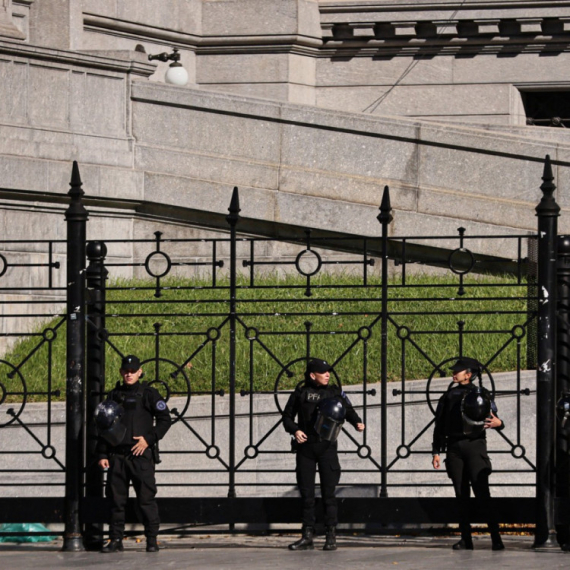
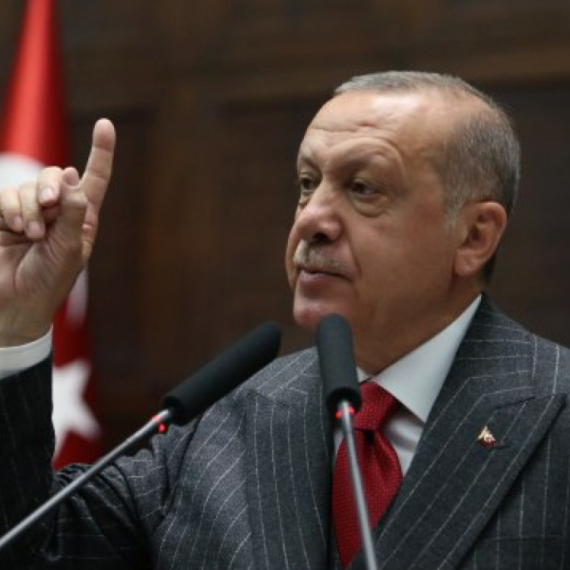
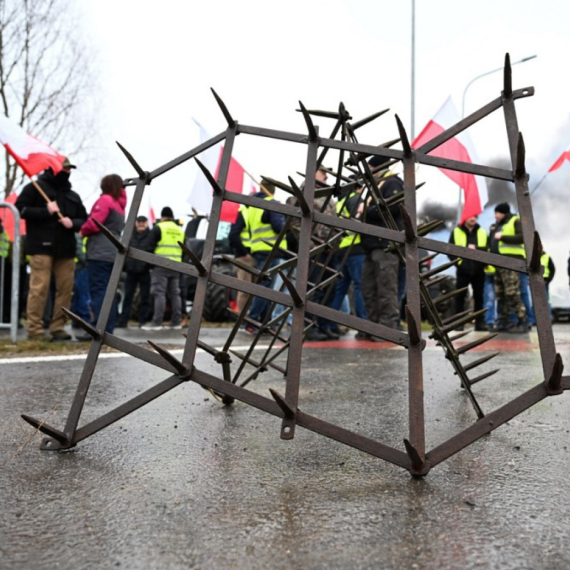


























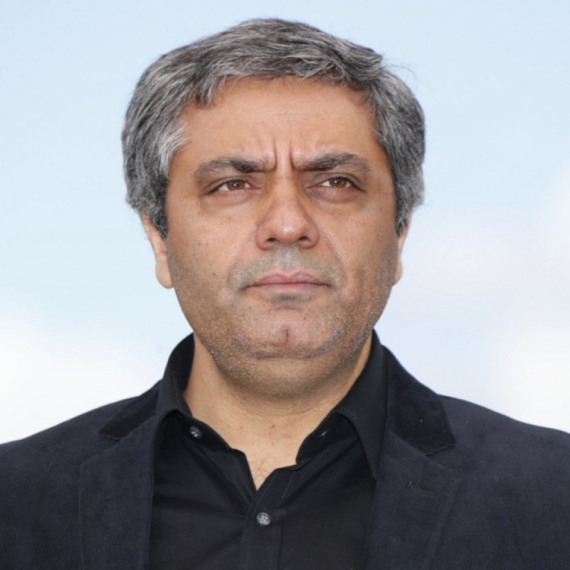



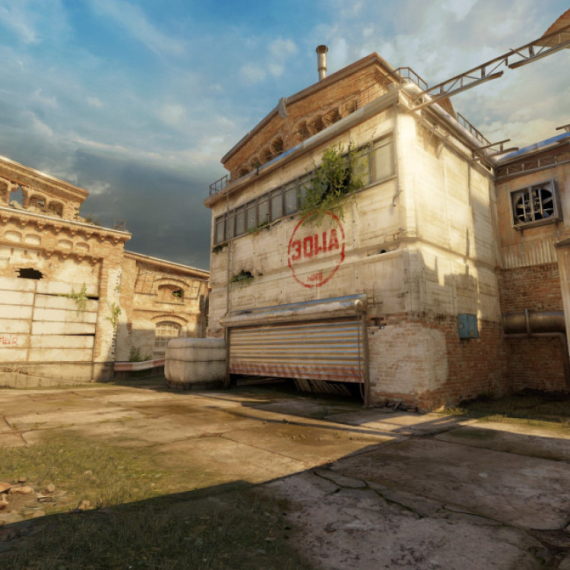














Komentari 2
Pogledaj komentare